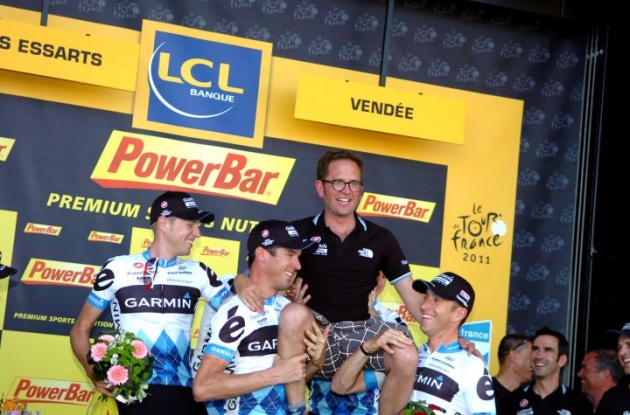Vaughters' Doping Confession
This past weekend Jonathan Vaughters authored an op-ed piece in the New York Times admitting to doping as a professional cyclist. To those that follow him on Twitter, it wasn't that much of a surprise. He'd been hinting at it for a couple of weeks on the micro-blogging site.
"I wonder if anyone is curious as to why I quit racing at 29, and walked away from the last 2 yrs of a pretty phat contract? Must be crazy," is one tweet he published at the end of July. On the Cyclismas.com site their contributor "Sarcastitom" chronicles much of the Twitter conversations Vaughters has had with people who react to this news like they were coming out of a dark cave and into the sunlight.
Throughout this initial exchange on Twitter, "Sarcastitom" accurately states that so far it's a "non-admission admission" to which Vaughters replies, "Dude, I am Jedi at that shit." So true ...
There are few directors that have embraced social media like Vaughters. He's made himself available to discussion and debate that can last for hours. As a result he's created JV fans that have become fans of his team, Garmin-Sharp. Or they were fans of the team and then became fans of Vaughters. Either way, can you think of any other director that has the fan base of Vaughters? Can you name more than a handful of team directors or team owners other than Vaughters and Johan Bruyneel?
So how is Vaughters a Jedi Master at spin? I suspect that JV has known for a while that the ongoing USADA investigation has his name somewhere in a dossier. Or perhaps Vaughters himself gave a statement about alleged doping that went on with the US Postal team. Instead of coming out years earlier, Vaughters' confession in the New York Times doesn't point to a specific date or race of when his doping occurred. The time frame we do have is that he cheated over eight years ago - beyond the statute of limitations.
There's another reason why he waited until now - to quote the blogger Inrng, "he would have been buried alive."
There is no upside to admitting anything years ago. Floyd Landis blasted off an email to USA Cycling and USADA describing in detail the names and dates of his doping offenses. The end result was he never rode as a professional cyclist again.
I was at the Amgen Tour of California when that happened and remember people on the side of the road holding signs with "Landis is a rat" like he'd given up information on the mafia. Vaughters said on Twitter that the vast majority of replies to his op-ed piece have been positive, so I don't expect to see any negative signage aimed at Vaughters at the upcoming USA Pro Cycling Challenge in Colorado.
Was it fair for riders like Landis, Filippo Simeoni, and Christophe Bassons to be burned at the stake? No. And to my knowledge no other professional cyclists showed any public solidarity toward these riders. Instead the riders of that era closed ranks to avoid the wrath of the patron of the peloton at that time, Lance Armstrong.
However Landis did take a different approach to his confession. Like I mentioned, Landis named names, gave dates, what he used, who he bought it from, and that was the end of Landis. He went scorched earth.
In his article Vaughters doesn't name anyone else involved. While I applauded his article and am glad that he finally came clean, he comes off as a victim - which is part of the spin by Jedi Master Vaughters.
In his article he talks of early morning training rides and sacrifices he made to get noticed in order to make the next step in his development as a rider, which included not having a homecoming date. Then he says he was given advice from a coach that he needs to cheat.
"If you just said no when the anti-doping regulations weren't enforced, then you were deciding to end your dream, because you could not be competitive. It's the hard fact of doping," is what Vaughters writes as to why he took the step to cheat.
I believe him when he says he wasn't hell-bent on cheating - that's how the system was set up. The rules weren't being truly enforced. Like Vaughters said, "it's like fudging your income taxes in a world where the government doesn't audit. Think of what you would do if there were no Internal Revenue Service."
To me Vaughters comes off as a victim. Instead of people getting angry, because they thought Vaughters was a clean rider who was fighting the good fight, they were lied to. But hardly a bad word was said to him. Me included. I tweeted to him that I was happy he came clean. The burden must have been tremendous. But Vaughters is skillful with the wording and timing of this announcement - the UCI is unlikely to take any action against him and he's seen as someone who was a victim of the professional European racing system and we should feel sorry for him.
Vaughters admittance was a step in the right direction, but upon further reflection I admire riders like Frankie Andreu who stepped up when it wasn't popular and faced the consequences of his actions. What would have happened if Vaughters had also stepped forward in California and come clean too? Perhaps this ongoing USADA, WADA, UCI alphabet soup of investigations would have been resolved, but I'm guessing in a manner that wouldn't have been good for JV.
In his article Vaughters says, "They were punished for following their moral compass and being left behind. How do they reconcile the loss of their dream? It was stolen from them."
"A code of values accepted by choice is a code of morality," is how Ayn Rand describes morality. Vaughters' code of values was to cheat and leave behind his compass because he needed a level playing field.
But who is the "standard" that we can hold ourselves up too? Vaughters isn't saying that it's him and frankly who or what is the "standard" is a philosophical question way beyond my scope. We are all flawed to various degrees. For some athletes doping is a ways to a means. To others it's deplorable and they leave the sport. And between those two scenarios there are numerous shades of grey. This is not a black and white topic.
You only need to read the news to see that some people we trust are far from trustworthy. Why should sport be any different? We make morality choices every day - some small, others huge.
Vaughters has hired riders that have served a suspension for doping, but curiously Landis wasn't included. I asked Floyd and he told me, "I asked JV for a job and he told me he can't hire me."
Why couldn't he hire Landis? Probably it would have made entry into European races that much harder as Landis had been very vocal about corruption in the higher echelon of the sport. Remember, this was before Slipstream Sports (the company behind Garmin-Sharp) was a Grand Tour and classic winning squad and they were considered the underdogs. Vaughters did what he thought was best for himself and the team, didn't hire Landis and didn't mention his own doping.
Another statement that rubs me the wrong way is that because there was no anti-doping "IRS" he cheated. Just because no one is looking doesn't make it okay to cheat.
It's becoming more and more obvious that the poop is about to hit the fan regarding the Armstrong era of racing. Riders are coming clean and some of Armstrong's most trusted teammates have given some type of testimony that looks to be damaging. Vaughters did the smart thing - admitted to the truth with zero blow-back on him. I'm still glad he stepped forth, but more good could have been accomplished if he'd done so years earlier. It would have seemed gutsier if he'd admitted to this when he had something to lose. But that's what having a code of morality is.
There may be more to this story when the USADA hearings commence. Perhaps Vaughters, on advice of his lawyers, has had to keep some details to himself which will be revealed later.
A lot of good riders have been left behind in the wake of non-admissions, either being driven from the sport or they saw how the sport of cycling was run and wanted no part of it. They made a painful choice. Playing the victim card is an easy way to dodge any significant damage and play it safe. So before we hold Vaughters up as an example, let's really look at his admission - a well-crafted and smart piece of writing that allows him to continue. Unfortunately there are many riders who don't have that option of continuing.
Follow Roadcycling.com on Twitter and Facebook to receive daily road cycling news updates automatically.








